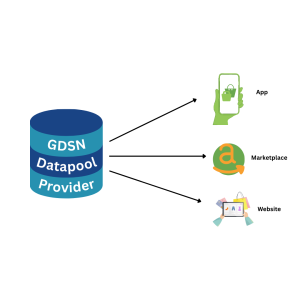Introduction
Today customers are interacting with products on various channels from online marketplaces, social media, retail stores, and many more and they are expecting consistent product experience from each brand they are interacting with. To do so, businesses need more than great products, they need effective ways to communicate their value. Enter product content syndication, a powerful strategy that ensures consistent, accurate, and engaging product information across all platforms.
Product content syndication is a strategic marketing approach that involves distributing and sharing product information, descriptions, images, and other digital assets across multiple online channels and platforms. This method enables businesses to efficiently manage and disseminate their product content to various retailers, marketplaces, and digital platforms, ensuring consistent and comprehensive product representation across the digital ecosystem.
Key Takeaways
- Product Content Syndication ensures consistent and accurate product information across multiple channels.
- It enhances brand visibility and helps reach a wider audience in diverse marketplaces.
- Syndication improves customer experience by providing complete and reliable product details.
- It reduces manual updates, saving time and effort for businesses.
- Ensures compliance with retailer and marketplace content requirements, streamlining operations.
- Boosts sales by delivering optimized and uniform product information to target audiences.
What is Product Content Syndication?
Product content syndication refers to distributing product-related information—descriptions, images, specifications, videos, and more—to multiple sales channels, marketplaces, and partner platforms.
This ensures that customers receive accurate, consistent, and compelling product details no matter where they encounter your brand.
For instance, if a brand lists a new product on Amazon, Walmart, and its website, product content syndication ensures that the product’s features, pricing, and images remain consistent across these channels.
Key Attributes of Product Content Syndication
- Centralized Management: All product data is managed from a single repository, making updates and modifications seamless.
- Automated Distribution: Automation tools allow businesses to syndicate content without manual intervention.
- Compliance Ready: Product data is formatted to meet the specific requirements of each sales channel.
Why Does Product Content Syndication Matter?
Inconsistencies in product data can confuse potential customers, erode trust, and even lead to lost sales. A study reveals that 87% of shoppers abandon purchases due to inaccurate or incomplete product descriptions. By syndicating content, businesses can maintain brand integrity, improve customer experience, and boost operational efficiency.
List of Solutions That Help With Product Content Syndication
Businesses don’t need to syndicate product content manually. Various innovative solutions streamline this process, saving time and reducing errors. Here are some key tools:
- PIM Systems (Product Information Management):
PIM solutions with digital asset management features, can help centralize product data and distribute it across channels. They also integrate with ERP systems for seamless data synchronization. - GDSN (Global Data Synchronization Network):
Ideal for industries like retail and healthcare, GDSN ensures product information meets global standards and is accessible to trading partners worldwide. - CMS Platforms:
Content Management Systems can be paired with product feed management plugins for basic syndication needs, though they are less specialized than PIM tools. - API-Driven Platforms:
Custom APIs allow businesses to create direct integrations with marketplaces, enabling real-time data updates. - Third-Party Providers:
Providers like Commport Communications specialize in EDI, GDSN, PIM, and data syndication, ensuring comprehensive and compliant content distribution across channels.
10 Benefits of Product Content Syndication
- Improved Customer Experience
Customers expect detailed, accurate, and up-to-date information when shopping. Syndication ensures they get just that, reducing friction in the buying journey. - Consistency Across Channels
Product details remain uniform on all platforms, reinforcing trust and reducing discrepancies that may cause customer confusion. - Enhanced Brand Visibility
By syndicating content to multiple platforms, businesses reach a broader audience and increase their chances of conversion. - Increased Sales
Accurate product data ensures customers make informed purchase decisions, resulting in fewer cart abandonments and more successful checkouts. - Reduced Time-to-Market
Syndication tools streamline the process of launching new products across channels, accelerating the time it takes to reach customers. - Regulatory Compliance
For industries with stringent standards, syndication ensures product data complies with legal and marketplace requirements. - Fewer Errors
Manual processes are prone to mistakes. Automated syndication minimizes inaccuracies, leading to fewer customer complaints and returns. - Scalability
As businesses expand into new markets or add new products, syndication tools make scaling effortless. - Better Analytics
Many syndication platforms provide insights into product performance across channels, helping businesses refine their strategies. - Cost Efficiency
By reducing manual labor and improving data accuracy, syndication minimizes operational costs.
How do Manufacturers, Suppliers, and Retailers Benefit from Product Content Syndication?
Manufacturers: Product content syndication helps manufacturers maintain control over their brand and product information across various sales channels. It ensures that their products are accurately represented, enhancing brand reputation and customer trust.
Suppliers: For suppliers, product content syndication streamlines the process of sharing product information with multiple retailers. This reduces manual data entry, minimizes errors, and speeds up the time-to-market for new products.
Retailers: Retailers benefit from receiving accurate and consistent product information from suppliers. This enhances the quality of product listings, improves the shopping experience, and reduces the likelihood of returns due to inaccurate product data.
Conclusion
Product content syndication is not just a strategy—it’s a strategic necessity in the age of digital commerce. Whether you’re a manufacturer, retailer, or distributor, syndicating your product data ensures customers get a seamless and trustworthy shopping experience.
Solutions like PIM systems, GDSN networks, and providers like Commport Communications simplify this process, allowing businesses to focus on innovation and growth.
As the digital commerce landscape continues to evolve, investing in a robust product content syndication strategy is essential for staying competitive. With benefits ranging from improved brand visibility to operational efficiency, the potential is limitless.
Commport Datapool Solutions
Download: GDSN Buyers Guide
Empower your business with global data synchronization; download our GDSN Buyer's Guide today and take the first step towards streamlined, accurate, and compliant product data management.
Frequently Asked Questions
AI-driven personalization, real-time updates, and deeper integration with IoT devices are shaping the future of product syndication, making it even more critical for businesses to adopt these solutions.
Consistent and accurate product information builds confidence among customers, reducing doubts and increasing purchase likelihood.
Commport provides comprehensive solutions for product content syndication, ensuring seamless distribution across multiple channels while maintaining compliance and accuracy.
Yes, most advanced syndication solutions integrate seamlessly with ERP systems to ensure data accuracy and consistency.
PIM focuses on managing and syndicating product data internally, while GDSN ensures global compliance and standardization for trading partners.
No. Small and medium-sized businesses can also leverage syndication tools to enhance their brand presence and streamline operations.





